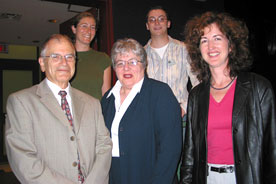Student assistants struggle to define their role

Dr. Neil Tudiver (bottom row left) met Dean of Graduate Studies Elizabeth Saccà, (centre) and Monica Mulrennan, Associate Dean of Graduate Studies, Student Affairs (right) just before giving the keynote address at the Graduate Students Association Conference on Sept. 15. In the back row are Carolyn Shaffer, Graduate Students Association Vice-President, Services, and Jason Moschella, Vice-President, Finances.
Photo by KAREN HERLAND
Their dual role as student-employees and a lack of standardization across disciplines make teaching and research assistantships a minefield for many graduate students.
That was the consensus of the small group of Concordia students who met on Sept. 17 to discuss working conditions with graduate students from universities that have unions. The discussion was part of the Graduate Students Association (GSA) conference, held Sept. 16 to 18.
Thomas Chiasson-LeBel, a representative of the newly established students union at UQAM, underscored the tensions students feel between their role as paid employees and the apprentice relationship many have with their supervisors. It is often difficult for students to set boundaries and claim rights in such situations.
Fred Ho, from York University, said setting out terms and grievance procedures between faculty and assistants does not diminish the potential for a collegial relationship.
“With a rules-based system, there’s a cultural shift. The relationship becomes more formal, but also more respectful.”
This formality also prevents professors from exploiting the apprenticeship side of the relationship. Some professors remind students of the valuable experience they are getting, even if it means unpaid hours, on-call status or putting their own research on the back burner.
Ho said the confusion for everyone is “Is it funding or is it work?” He cautioned against the use of teaching and research assistantships as incentives for “the best students, as if you can determine who they are before they get here.”
Instead, he said that assistantships should be based on need. The York union is now in a position to allocate bursaries, childcare subsidies and emergency funding for union members in need.
Lillian Radovac, of McGill University’s union, said, “If we don’t work, we’re not here.” For many students, that means multiple part-time or casual jobs, on and off campus.
“God forbid you have a family to care for on top of that.”
Chiasson-LeBel said that the first article of the UQAM students’ new collective agreement says their priority should be their studies. University employment should facilitate that goal by contributing to students’ experience, but not at the expense of their own work.
This is also a central theme of the collective agreement at York, one that other unionized students held up as the model.
Students from UQAM praised York’s agreement for addressing issues particular to students that do not apply to traditional workplaces. For instance, how do you negotiate sick leave if you are working in your free time from home?
Currently, the answer to that question is different from one faculty to another, and even between professors in the same department. One student who attended the workshop spoke of professors who expected their assistants to attend every lecture, maintain office hours, and address student questions via email, in addition to staying on top of the material.
Teaching assistants are also expected to mark assignments, whether or not they were given marking keys or other guidelines. In some departments, that responsibility might extend to a class of 18 students, in another, more than 100. Science programs expect teaching assistants to staff labs for additional hours, the scheduling of which is up to the professor.
Universities lack central information on working conditions across departments. Students reported that some professors are hiring graders out of their own budgets. Because these are private agreements, there is no set wage or job description, and no way to know how many students hold such positions. Students do not know when positions are available and how they are allocated.
Heather Fussell, GSA Vice-President Advocacy, pointed out that the three grades of teaching assistantships at Concordia do not clarify the situation.
Grade 1 is a very broad list of tasks, Grade 2 is described as a ‘subset’ of Grade 1. Although the pay is less, the number of tasks or expectations is undefined. Grade 3, the least remunerated position, is limited to marking.
Marc-Etienne Ouimet, who is Communications Officer for McGill’s union, discussed the challenges of collecting information across faculties. “Whatever you do, you have to do it in three or four months — well, maybe eight months — but after that, it’s a whole new group of people.”
That high turnover is another reason that equity across faculties has been so elusive, Radovac said.
The union’s role as a collective memory that remains after individuals graduate and move on is one of its strengths: “The administration is also now legally obligated to meet with us.”
Representatives from UQAM agreed that a collective agreement has legitimized the contribution of graduate students.